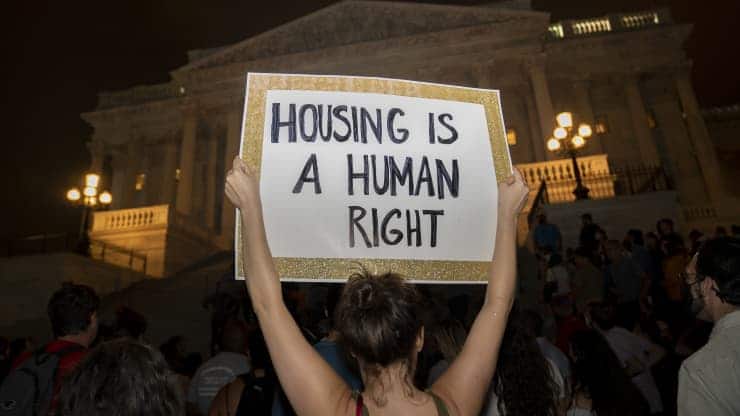Despite tens of billions of dollars in rental relief being made available to tenants who are behind on their housing payments, the number of eviction filings is already ticking up in some states just days after the Covid-19 eviction moratorium lapsed, housing attorneys say.
While over $46 billion in rental relief was allocated by the federal government, just $3 billion has made it out.
Each state has its own program and process for disbursing the aid. However, tenants face an uphill battle when it comes to getting the relief, since they have to overcome multiple barriers, says Caitlin Cedfeldt, staff attorney at Legal Aid of Nebraska. Cedfeldt represents tenants in eviction cases and helps them access financial assistance.
The most basic barrier, at least in Nebraska, is that many tenants often have no idea the assistance is even available, says Cedfeldt. “If they are aware, they might not know that they are eligible for it, especially if they have already received it once,” says Cedfeldt.
Qualifying households are eligible for up to 12 months of back rent for debt accrued since March 13, 2020, as well as up to 12 months of electric or gas utility back pay.
Online-only applications present another challenge for people who are not tech-savvy or do not have internet access. The applications are not particularly smartphone-friendly, Cedfeldt says, and many low-income tenants only have access to a smartphone rather than a desktop computer.
It can also be difficult for tenants to procure the documentation required to apply for the relief. Typically, a photo ID, employment verification and written lease is needed, says Cedfeldt.
“The written lease in particular can be difficult if your landlord is not wanting to participate in the program or just wants the tenant to leave,” says Cedfeldt.
And while Cedfeldt says most landlords are participating in the program, it can be difficult to get some to “sit down and do their part of the application.” Landlords need to provide paperwork including a lease and documentation of rent owed, as well as sign off on the application.
“Usually at this point the relationship is so strained that the tenant may not want to contact, or has a hard time getting a response from, the landlord,” she says.
Federal government let the eviction moratorium lapse
The eviction moratorium had been in place since the start of the coronavirus pandemic in 2020. But it lapsed on July 31, with Congressional Democrats and the White House at odds over which branch should extend it.
The Biden administration says that it is unable to extend the ban after a recent Supreme Court ruling said only Congress has the authority to do so. Democratic leaders in Congress, meanwhile, could not get the votes needed to extend it and say the White House should have done so regardless of the high court’s ruling.
Now, the Biden administration is calling on states to extend or put in place their own eviction moratoria for at least two more months so tenants can access the rental assistance. Some states, including California, New Jersey, New York and others, have already done so.
Over 11 million adult renters are behind on their rental payments, putting them at risk of losing their homes in the coming months if they don’t get the emergency rental relief.
If you are behind on rent due to a Covid-19-related job loss or illness, you likely qualify for emergency rental relief. Contact your local Legal Aid office for help accessing it.
Source: CNBC




